Is Metamucil Safe? The Truth Behind This “Doctor Recommended” Product
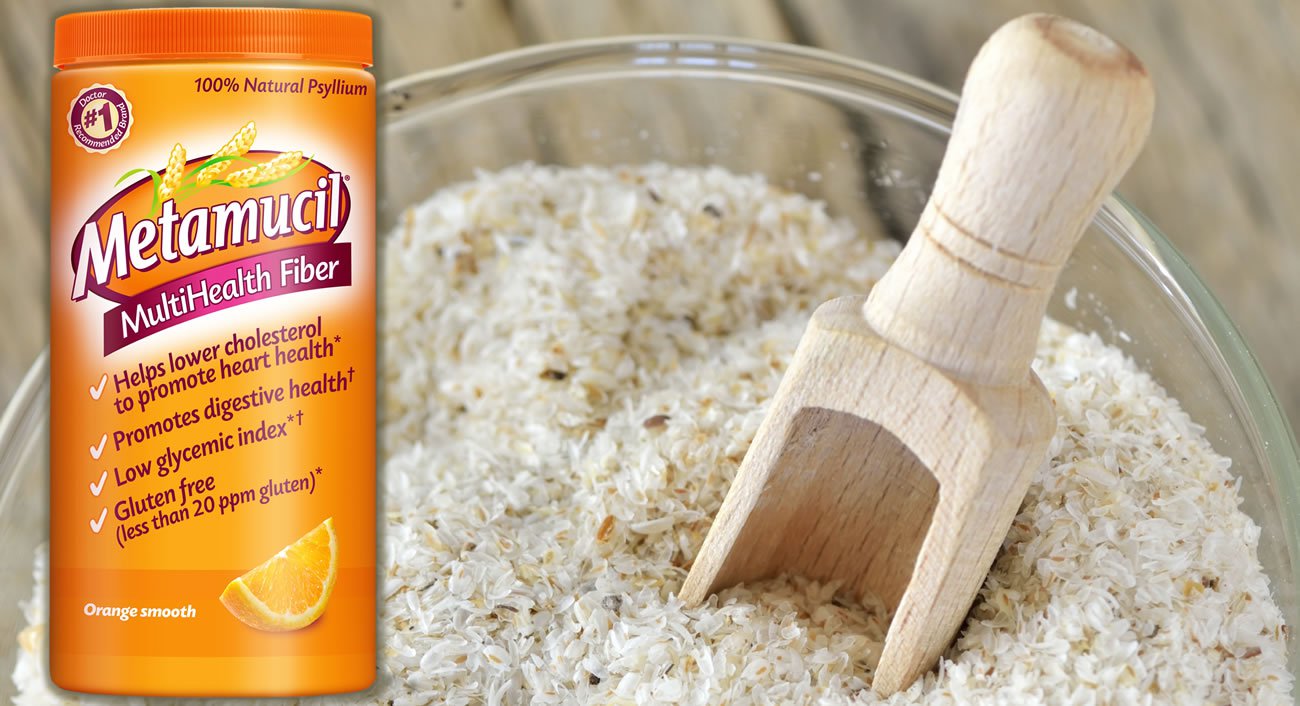
I had a lot of thoughts on names for this post. Everyone around here nixed my first attempt so I went with number two. (Get it?). Yes, we’re talking about everyone’s grandfathers’ morning ritual beverage to get those bowels moving: Metamucil. Here’s what you really need know about this fluorescent orange colon unclogger touted as “#1 Doctor Recommended” fiber brand. In short, is Metamucil safe?
I would just like to point out before I go on, that most fiber products, the really good ones that are free of sugar or aspartame or artificial colours, don’t actually carry a brand name. Usually they’re called things like “flax seeds” or “psyllium”, but I’ll get there.
Having just spent way more time than anyone probably should on the Metamucil website, I have learned two things:
- They have a section full of Metamucil drinks (see below) that are all dressed up like what you might find on a cocktail menu at an all-inclusive resort.
- All of their fiber supplement products can and should be replaced by one single ingredient product: psyllium. All of the other products (Immune Support, Energy Support, etc.) should probably go away completely as there are actually effective alternatives available that don’t have the long list of “non-active” ingredients.

Today, we’re focusing on the classic that is a staple in every senior citizens’ medicine cabinet: Metamucil.
Constipation: The Backlog of a Nation
Up to 19% of the North American population (about 63 million people) are not pooping. So yes, we know constipation is a major issue. We also know the key contributing factors. They typically include (in no particular order):
- Lack of fiber intake in the diet
- Lack of water intake in the diet
- Too much sugar in the diet
- Too much fiber-free starchy carbohydrates
- Gut microflora imbalance
- Food allergies or sensitivity
- Poor digestion
- Stress and anxiety
- Lack of exercise (helpful in stimulating motility in the colon)
Here’s the thing with constipation – it is completely avoidable with diet and lifestyle changes.
Here’s the other thing about constipation – sometimes, despite our best efforts, we are going to get bunged up.
Why Metamucil Is Not The Optimal Safe Option
There are a few different options when it comes to Metamucil fiber supplements. I assumed, at the very least, there would at least be a plain option I could recommend. At least that was what I assume “Metamucil Free” was going to be. I was wrong.
Metamucil Free
This one looked and sounded promising with the bold statement: “Metamucil-Free is free from artificial sweeteners, colors, flavors, and gluten as well as milk, eggs, fish, shellfish, tree nuts, peanuts, wheat or soybeans.” It turns out that’s all healthwashing.
As I have often said, it’s not really about what’s not in a product. We need to pay attention to what is in there.
What’s Metamucil Free not free of? Sugar. In fact, sugar is the first ingredient.
Sugar is the first ingredient in Metamucil Free
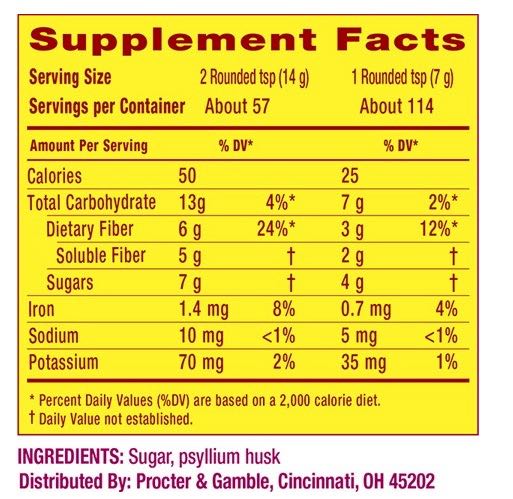
Beyond the simple fact that we know sugar is not health building in the body, sugar is also a key contributing factor to constipation.
Studies repeatedly show how diet-induced dysbiosis (imbalance in the gut microflora) contribute to constipation and/or diarrhea. Sugar is the band leader on this parade of dysbiosis. What we need to accept is that fiber supplements are not delicious. They aren’t meant to be and don’t need to be. So why is there more sugar than fiber in a single serving of a fiber supplement.
Metamucil Math: Part 1
- Recommended serving of Metamucil Free for constipation: 1 rounded tsp (approximately 7 grams)
- Amount of sugar per serving of Metamucil Free for constipation: 4 grams
- How many teaspoons is 4 grams of sugar? 1.
- How much of the suggested serving is actually fiber? Roughly the “rounded” bit.
There is twice the sugar than there is soluble fiber in 1 tsp of Metamucil Free.
If this math is confusing, it’s likely meant to be. The fact is that grams is a measurement of weight, and sugar is heavier than fiber.
What Does This Mean: It means that with Metamucil Free, you’re taking 1 teaspoon of sugar to help with constipation, which makes me wonder, in this case, if it’s the Metamucil at all that is helping people poop, or the glass of water being consumed with it.
Metamucil Orange Smooth
This is the classic I remember my grandpa drinking. I was pleased to see that with this option, at the very least, psyllium is the first ingredient. What follows is nothing to be proud of. The classic ‘orange’ option contains the following:
Psyllium husk, maltodextrin, citric acid, natural and artificial orange flavor, Aspartame, Yellow 6.
Let’s break this down:
- Maltodextrin: Most often it is used simple as a cheap filler in processed foods, basically to take up space in a package. In this case, it is adding bulk to a product that is intended to add bulk to our intestines and really, just having more psyllium would be helpful. Interestingly, maltodextrin can elicit spikes in blood sugar because it has a high glycemic index. Now, in this case, the psyllium fiber would likely offset this effect but curious all the same in a product that contains artificial sweeteners and designed to be a ‘sugar-free’ option for diabetics. Maltodextrin, however, can affect the gut microbiome, suppressing the activity of the good bacteria in the gut which in turn can contribute to further constipation issues.
- Citric acid: Typically used as a preservative
- Natural and artificial orange flavor: There isn’t much difference between natural and artificial flavours. Both typically start out as a real food and through many lab experiments and processes end up as a concentrated flavour agent. These flavor agents have been shown to adversely effect our body’s detoxification pathways and have been associated with an increased risk in brain tumour development.
- Aspartame: Aspartame has been proven in studies repeatedly to have severe neurological degenerative effects, that increase with repeated exposure. Considered an excito-toxin, aspartame should be avoided. Here is a sweet round-up of 28 studies that associate Aspartame with a buffet of health conditions and concerns.
- Yellow 6: First of all, it’s a fiber supplement. Do you we care what colour it is? Yellow 6, derived from petroleum, is known to cause allergic reaction, and contains benzidene, a known human and animal carcinogen that can impact behaviour in children. Studies have also shown an association between this food dye and gastroenteritis – not helpful when trying to work out some constipation.
What Does This Mean: Though you may be getting a dose of fiber to help with constipation, you’re also getting a cocktail of a whole lot of other unnecessary chemicals that have been associated with increased risk of a whole lot of other conditions that are far more detrimental to our health than constipation.
META HEALTH BAR CINNAMON OATMEAL RAISIN
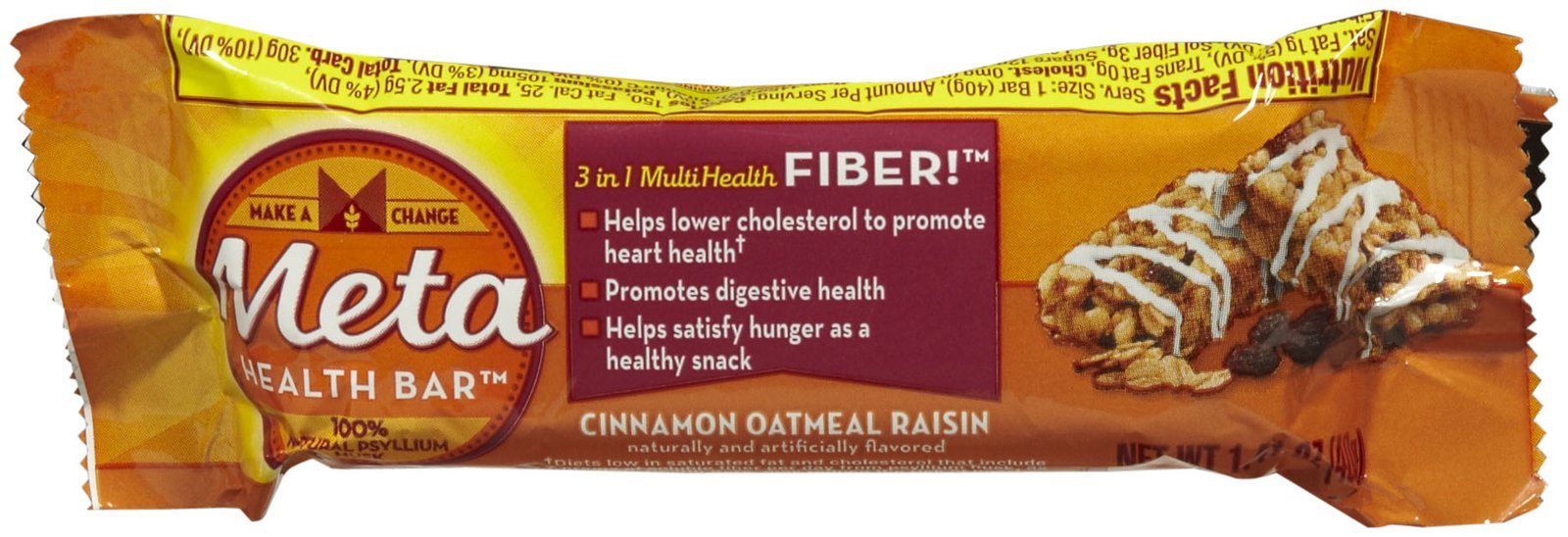
I was going to stop after the analysis of the typical Metamucil products, but then these candy bars, I mean “fiber bars” also caught my attention.
Here is what Metamucil has to say about their bars:
A tasty way to help lower your cholesterol to promote heart health. Power your health from the inside with Meta Fibre Bar Cinnamon Oatmeal Raisin—the delicious and nutritious way to boost your daily fibre intake while you go about your busy day.
Made with 100% Naturally Sourced Psyllium Fibre, Meta’s Fibre Bar:
– Helps lower cholesterol to promote heart health
– Promotes digestive health
– Helps satisfy hunger as a healthy snack
Up the fibre in your diet with Meta Fibre Bar—
a small simple step toward a healthier lifestyle.
Ingredients In The Meta Health Bar Cinnamon Raisin
Rolled oats, corn syrup, crisp rice (rice flour, malt extract, salt), raisins, invert sugar, granola (rolled oats, sugar, canola oil, honey, molasses), corn syrup solids, psyllium husk, raisin paste, glycerin, white compound coating (sugar, palm kernel oil, corn syrup solids, whey protein isolate, titanium dioxide, soy lecithin, salt, natural and artificial flavors), sunflower oil, natural flavors, gum acacia, soy lecithin, salt, tocopherols.
Here is What I Say About Their Bars
This is actually a candy bar. Likely a bad tasting one.
The nutritional label lists a total of 30grams of carbohydrates.
It is broken down as:
Dietary Fiber: 4 grams
Soluble Fiber: 3 grams
Sugar: 12 grams
Metamucil Math: Part 2
When we add up the dietary fiber, soluble fiber and sugar, we get 19 grams.
Where is the extra 11 grams that make up the total carbs? Well nutrition labels typically won’t list the grams of starch. Those 11 grams are starch, which breaks down in the body into simple sugars. What we end up having is in fact 7 grams of fiber and 23 grams of sugar.
Extra fun: Go back up and look at the ingredient list for this bar. How many forms of sugar can you count? (Answer at bottom of post)
Given that psyllium is largely soluble fiber, and that it is really the only active ingredient in these bars, you might be interested to know:
- 3 Tbsp of flaxseeds contains approximately 3 grams of soluble fiber
- 1/2 cup beans or chickpeas contains 2 grams of soluble fiber
- 2/3 cup of cooked oatmeal contains 3 grams of soluble fiber
- An orange has 2 grams of soluble fiber
- 1 cup of cooked asparagus has 3.4 grams of soluble fiber
- 1 medium avocado has 3.4 grams of soluble fiber
What Does This Mean? If you eat a well rounded plant-rich diet (hello UnDiet living!), you are going to be getting way more fiber than what’s in this bar.
Psyllium: Because Sometimes You Do Just Need More Fiber
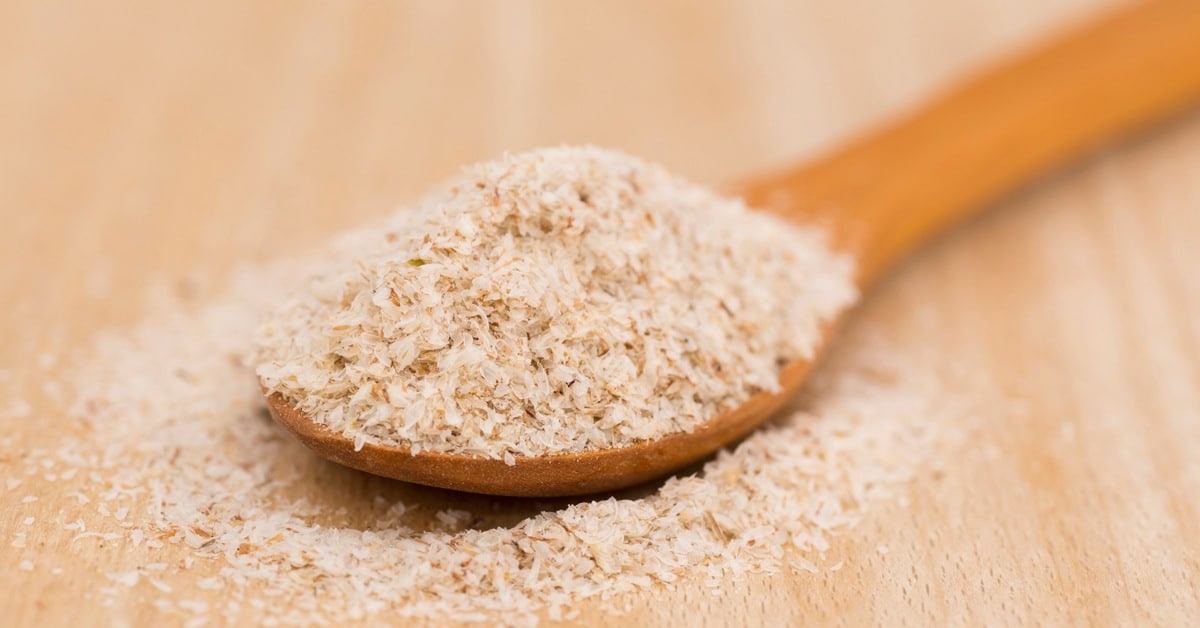
Psyllium is the active ingredient in all Metamucil products. The name, in fact, comes from the “mucilaginous” property of psyllium, the slimy soluble fiber effect you’ll also find in soaked flaxseeds, chia seeds, aloe, slippery elm and Sea moss.
The key to resolving constipation through fiber intake is taking in the actual fiber. And it works.
Psyllium is one of the most health supportive and powerful fibre supplements. It is like the great grand-daddy of the fibre world. Yes, it can be gag-inducingly awful to get down, but it is worth it.
Benefits of Psyllium Fibre
- Laxative Effect: Increasing colonic bulk stimulates propulsion (meaning evacuation). Psyllium husk provides the bulk that gives your colon something to grip on to and strengthen against – like a resistance band. It increases stool weight, while toning the smooth muscle that is the colon and promotes laxation by increasing the moisture content of our poop.
- Anti-Carcinogenic Effect: The structure of psyllium fibre is like a magnet to toxic waste in the digestive system; it grabs on for dear life and removes it from our bodies. In short, it helps remove waste efficiently.
- Intestinal Health: The colon of the human gastrointestinal tract contains a large population of resident bacteria. In fact, 55% of the solids in poo is microbial biomass. Psyllium is awesome at maintaining the bacterial balance in our colon, which then strengthens immune function.
- The Great Sponge: Psyllium can absorb a huge mass of water and other stuff. It has the ability to absorb excess bile, cholesterol and hormones like estrogen from the colon. If these aren’t removed efficiently, they get reabsorbed but this doesn’t mean the body stops producing them. The body will still produce cholesterol and so cholesterol levels go up. The body will still produce estrogen and so estrogen levels go up. And do we all know what high estrogen levels mean? Weepy tantrums during PMS and greater breast cancer risk to name two.
How To Take Psyllium
Capsule Form
The easiest option is in capsule form. This is the least-gag inducing way to get it down, but know that you will be taking a lot of pills and it is more expensive this way.
Powder Form
Start with 1 tsp stirred into eight ounces of water. You may wish to slowly work your way up until your poop is adequately bulking. Always ensure you increase water intake accordingly.
I want to wear a badge of honour that proudly states “I down 3 Tbsp of psyllium in one go”. As bad as it is to do at the time, I am always mighty proud that I went through with it when all goes according to plan in the morning.
Note:
- Adequate water intake is important!
- Best done on an empty stomach
- Though psyllium is often used as a binding agent in gluten-free baking, when used in this way, you are not getting the constipation remedy effects.
And so, if you are suffering from constipation, your priority should be to determine the root cause and resolve that. And if you want to up your fiber to increase transit time, tonify the large intestine, rebalance gut microflora and make your mornings an easy and efficient elimination process, then by all means, please invite psyllium to the party. Just leave out all the extra garbage.
* Answer to Metamucil Bar sugar question: There are a total of 11 different types and forms of sugar.
Free Resource Library
Enjoy more than 40 downloadable guides, recipes, and resources.

















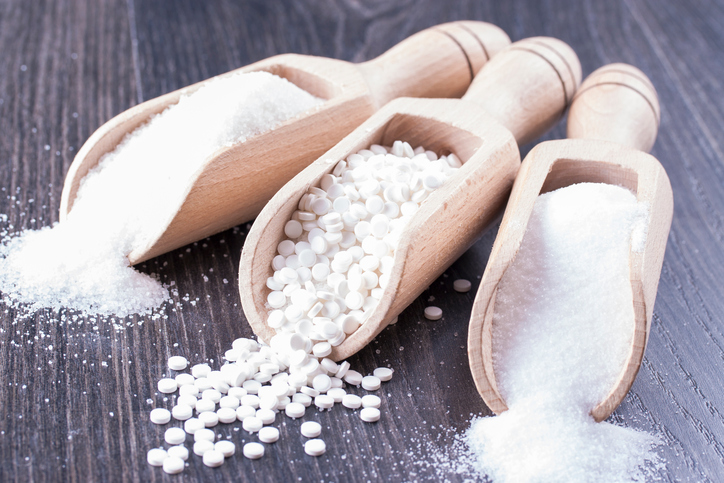






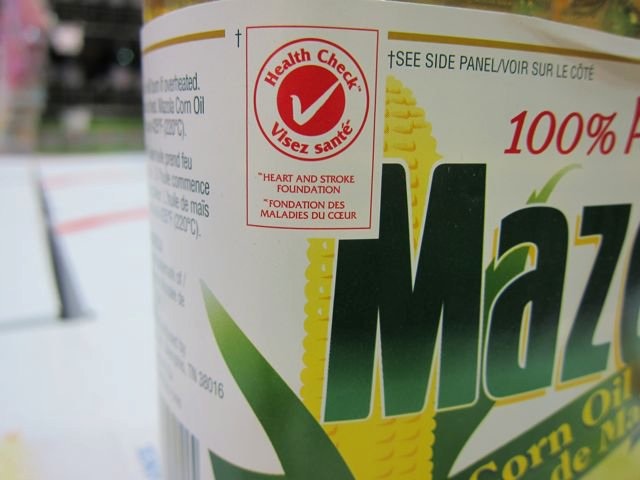
A splash of lemon or lime juice makes a big difference to a plain psyllium drink–even my kids think it’s “fine” (not “awesome,” but hey, good enough). I also have a small chaser–some sort of palate-cleanser–at the ready, just in case. ;)
Years ago, after surgery, the nurse came in to talk to me about the importance of increasing my fiber intake. I thanked her for her advice, knowing I already had a high fiber diet. The next morning, they brought in my first real meal. It was white bread french toast (with margarine and fake maple syrup, cream of wheat, skim milk and coffee. I just couldn’t eat it. When the nurse came back in, I said, “I have a question? Where is the fiber?” She said, “I have it here.” And she handed me a high fiber tablet to swallow with some Metamucil. I almost laughed out loud. I asked if there was a possibility that she could find me a banana or any fruit they might have.
I had to wait for lunch. Fortunately I was only there for a day.
Thank you for this post! I will be sharing this. Who doesn’t know someone taking this garbage every day!!
I have a questions about when to take psyllium. Should it be first thing in the morning or at night?
Love your posts, thank you!
I appreciate this article I have a redundant colon. You always provide outstanding information. I will be looking in to this when I return from traveling abroad. Which always so difficult to stay in a routine. I have suffered on many trips.
Not anymore.
Thanks
Thank you for this post and all the research you’ve done. We are so glad you enjoy researching things like ‘crappy fiber supplements’ LOL !!!
We can all learn from you!
You wrote this really well. Thank you for continuing to research health topics on so many people’s behalf. You made this really easy to follow!
Thanks for this great information!
When in need, what I do to take psyllium is that I actually put a tablespoon or so in my morning shake… It will thicken it a bit, so you can use a little bit more liquid if you like your shake thinner, but it works like a charm!
Metamucil was recommended for colonoscopy prep, where can I find info on using plain psyllium?
Thank you for this article. I have recently started using Metamucil and while I like the way it works I always suspected there was just too much going on with this bright orange sweet orange flavor. After your article I went right on Amazon and ordered Organic Psyllium to replace Metamucil. I really appreciate the way you write and it helps those of us who just want straight forward information and direction. All the best!
In my youth I was a laxative junkie but did a total 180 after I was told that I was too obsessed about it and should not worry. My diet is full of grains and vegetables(and chia seeds) but I still have a difficult constitution. After taking your CNE class, I realize how dangerous it is not to be more regular and I need to be more pro-active. Thank you for this post!!
Thanks! Great write up. A friend gave me some Metamucil and I just started using it blindly. I like what you have to say! I used to use flax now I might try ordering some psyllium. Putting the other stuff in the garbage.
What brand of Psyllium do you recommend? Thanks!
Thank you for this information. My mom is diabetic and that’s what she is drinking.
I was recently told to start Metamucil. I was put off by the artificial ingredients. But after some label reading I found both Metamucil and the CVS generic brand have unflavored versions that are just psyllium. They don’t taste the best, so I do add some flavoring in my own but it’s far less sugar and more natural than the orange stuff.
My father died from colon cancer at 47. I have been taking a product called Fiber & Spice. I order it online. It seems like a good product but I would like your thoughts on it. Thanks.
So happy I found your blog tonight. I was going to go out and buy Metamucil tomorrow. I’ve seen the latest commercials with the girl dressed in an orange skirt skipping about, feeling lighter, less bloated and happy to have a cleaner gut. I will try the psyllium and see what transpires, but most of all I am thankful for your research and information.
My new doctor said to get some Metamucil, and I did; although, I haven’t taken any yet. However, after reading your blog here, I think it should be made clearer to readers that if you have something other than simple constipation (i.e. IBS or similar) you may want to ask a few more questions before switching over psyllium. Not that I think Meta products are worth taking, especially considering the ingredients. But I’m reluctant to jump into psyllium given the abdominal pain from IBS.
Just go get some Konsyl…it’s JUST psyllium with no other ingredients. ———- I have IBS – D and Benefiber is a much
better fiber for me…the insoluable fiber irritates my irritable bowl and MM causes too much gas with upsets the IBS (sensitive colon). Don’t worry about all the metamucil products, just ignore all that song and dance (fillers/sugar etc). You can try Benefiber if you have IBS – D (or C) or Konsyl (plain psyllium) if you don’t have IBS.
Thanks so much for being up on this topic. My Dr. raved about meta mucil so I went out and blindly bought some although I am never constipated. After tasting it and going back and reading the label, I was shocked at the ingredients – yuck! Trust P&G to mess up something that should be healthy.
Thanks so much for this info. You really summed it all up and I’m very impressed. Glad I read this before purchasing Metamucil. Great job !!
Love your articles Meghan. I took psyllium a few years ago, and searched for a plain, unsweetened one. However, I tend to be hypoglycemic on occasion, and when I was taking psyllium I started to have dizzy spells. Psyllium may affect blood sugar levels, which is what happened to me. Fortunately I was able to continue with a high fibre diet that solved my problem. Happy eating.
After reading your informative article, I am returning my Orange Metamucil. Aspartame!? Maltodrextin!? I only read the top part of the label and the marketing – but didn’t pay enough attention to the ingredients. Thanks for educating us, Meghan.
You can buy simple psyllium powder at a health food store in bulk: About $9/ pound for finely ground one. Don’t need a special “product”. To achieve the Metamucil capsule dose (5 capsules per serving) mix 1 teaspoon with ice water or juice, shake it in a shaker cup, and drink it FAST before it thickens. Follow up with a big glass of water. Flavour water with lemon or orange bitters (tastes marvellous). Drink is a bit gritty. Here’s the kicker: if you’re buying cheapest capsules at Costco, (Jan 2018 in Canada), it will cost you .73/per 5 capsules (one dose). At two servings per day (recommended), that would be $10.28 per week. If you buy bulk, at $9/ lb. it’s $.06 per serving (1 teaspoon), which is $.84 per week. I emptied out 5 caps of Metamucil into a teaspoon measure, so I’m confident of my numbers. Metamucil is not only a sugar and chemical sink, it’s also a total rip off!!
What I don’t understand is all the rave about a simple teaspoon of sugar… I bet half of the people that steer clear of this product because of the sugar also have a soda with their lunch or at some point in the day or I am not being against this post but please help me see where 1 or 2 teaspoons of natural sugar is bad for you… I have read where some of the posts say they take the natural psyllium and mix it with orange juice… you might want to check the ingredients of the orange juice… please advice if I am not seeing something here… thank you for your replies
Hi. You mentioned that it’s best to take psyllium on an empty stomach, but that you take it in the mornings. Can you say more? Do you take it right before eating breakfast? Or, should it be taken a certain amount of time before or after meals?
Tried all the “natural” and “organic” pure psyllium stuff out on the market and health food store. Nothing works for me like Metamucil Free. Maybe its the way P&G mills it. Sorry I’ll put a little extra sugar into my diet for the results I get. I wish they didn’t put so much sugar in it but I won’t use their artificial crap without the sugar.
The Metamucil I have says Made with REAL SUGAR. However, the ingredients are :Sucrose as the first ingredient, and sadly one serving is 16 grams of sugar, which I believe is more than you should have in a day, and have this up to 3 times a day… So that is 48 grams of sugar. I have been taking it for a month, and I have noticed weight gain just in my stomach. It’s going back to Costco.
Great article, well written, easy to understand. I learned a lot, thank you!
They also have a 100% psyllium one.
I am a life long Metamucil user. Your article allow interesting lacks information about the product. Your research may have concluded prematurely. I live in Canada and always buy the sugar free version of Metamucil. The ingredients are as follows: Psyllium Husk, maltodextrin and Citrix acid. My doctor recommended this 30 years ago. I tried using plain psyllium and results were not the same.
You may want to give Konsyl or Hydrocil powder a try. Neither of them have sugar and both are crushed psyllium husks. My husband prefers Hydrocil because it has an additive that makes it smoother when mixed with liquids. It’s gotten hard to find over the 40 yrs he has taken it, so he asks the pharmacist to order it for him, but he could just as easily get it on Amazon. Konsyl I get at Walmart. It’s the plain old Original Formula and it has only psyllium hydrophilic in it’s ingredients and mixes up much smoother than any of the generics I have tried. Metamucil has seemed to have become the trade name for fiber so I just wanted to mention some alternatives that are available.
Need advice. Everything works well with one cinnamon metamucil cracker pack per day. I tried to replace the cracker pack with 5g of plain psyllium husk fiber in water, and to my great dismay, it was not bulky and smooth, it was splatter. Any suggestions?
Im having digestion issues and my gastro Dr recommended fiber supplement so I’ve been using Metamucil and a pro-biotic. Seems like everything is the same or even worse. Extremely lose stool, do think it could be the daily metamucil? Im frustrated…….
Hi, I’m 33 and started taking Metamucil just to help with general gut health as it’s hard to ALWAYS maintain a balanced diet with enough fiber. Before taking Metamucil I noticed my bowel movements were inconsistent, sometimes easy and clean and sometimes not – so I wanted to make this more consistent. After being on Metamucil for a few weeks I felt great. Regular, light, clean and easy every time. However, similarly to your notes above, I wondered if I could cut our all the extras that are in Metamucil (that you very helpfully explained above). I went out and got some Psyllium husk. I started taking the husk mixed with Metamucil and water – I took the normal amount I would take of Metamucil but made up of part Metamucil and part husk. I thought this would be a way to ease my body into taking the husk and also to use up the Metamucil I had left. After doing that for about a week I have noticed that my movements although still regular are not as clean as before, more sticky and I definitely don’t feel as light. I’m wondering whether to persist with the husk? Is it just an adjustment period and I need to give it longer? I didn’t get powdered husk, could that be it? Should I stop mixing the two and just try husk? Any advice?
Since reading your post – I have tried to even drink 2 Tablespoons of Psyllium husk powder in water. Gulping as fast as I can, I simply cannot do it before it becomes so thick I choke or gag. I read that you have accomplished 3 Tablespoons BUT in another one of your posts, you said you use whole psyllium husks not the powder?? I have been afraid that the whole husks would tear up my system! Can you tell me how much water you use . . . ? I do not mind the taste, I just need to figure a way to swallow it!
Psyllium husks only mixed with molasses is what I feed to my horse to rid sand in the gut as it forms a gel in the gut you cannot mix water with it. My vet recommends once a month as regular use makes the bowel lazy and it needs to work on its own without help. Does this apply to humans as well ? Regular use of Metamucil is not good but tv advertising advocates daily use this is wrong advice to sell a product that also has a lot of sugar which takes water from the gut causing constipation Eat More Veg and Fruit.
Great article but I did just want to point out that your statement of “constipation is completely avoidable by lifestyle and diet changes” is false. I am a competitive bodybuilder who eats 30+ grams of fiber daily, Whole Foods, 1.5 gallons of water and exercises 5-6 days a week and still struggle with constipation. I have a history of an eating disorder and chronic laxative abuse which unfortunately can’t be fixed or undone.
I am presently taking Metamucil capsules and they do not contain sugar just psyllium and gelatin. I hope I am correct.
This was a very interesting to read since I just started using Metamucil about a month ago for more regular bowels. I had noticed that I had more gas and bloating than usual. Wondering if it could be something else though since my diet is not always clean. I don’t eat a lot of fruits and vegetables but try to eat healthy otherwise. After reading this article I started using just plain pysillium powder and have noticed less gas and more normal bowels. I take it in the evenings and it seems to work well with my body. Thanks for opening my eyes to a product that I thought was okay all along to put in my body. We have to read those labels!!!
Thank you so much for this information. Today I bought some Metamucil and just happened to hear a podcast regarding maltodextrin. I did more research and my Metamucil is now in the trash. Thanks again!
You missed one crucial point:
There is a “no sweeteners added” version of Metamucil. This product truly has no sugar. I’ve been using this for years. That said , it still has citrus acid for preservative purposes.
Ground psyllium is no where nearly as effective for me since it’s clumps and doesn’t seem to distribute evenly in my gut resulting in uneven result in stool.
Note that the ‘No sweeteners’ version of the product is always in short supply so I usually end up ordering online and pay a premium.
Took the lowest dose of Metamucil for three days to no avail. No BM. Just curious where this stuff goes, if it does not work, can it cause bowel obstruction? Anyway my question is: if I take pure psyllium will it just add to the problem or push the bad stuff out. Really worried about bowel obstruction. Thanks for you article contesting the big (not so great) brands.
As a person with life long gastric problems. I’m confused on the constant focus on sugar. The colon needs sugar in the body to pull to the colon to digest foods. Hence medications like lactalose and crystalose.
Also work it being the number one medications in elderly cabinets there’s no mention of how certain medications cause constipation I would think that’s a leading factor in part of the worldy constipation issue. Curious if you have study anything on that and if any substitutes for Metamucil are safe to mix with medications. Honest question not trying to be rude. Medications I’m on life long are the cause of my issues and have been trying to find a less sugary safe effective solution. That will not make my kidneys worse or affect the medications effectiveness as well.